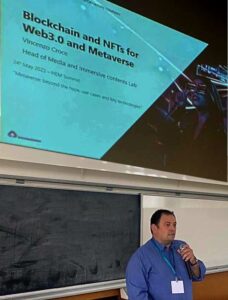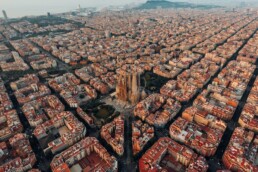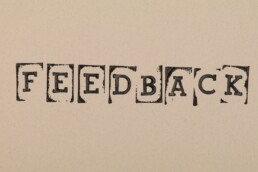DAFNE+ 4th Plenary Meeting in Paris
Our 4th General Meeting started punctually. DAFNE+ project partners have travelled to Paris to assist to Ircam Forum facilities for the venue. Two days of intense meetings and discussions that have pushed the project forward.
As the launch of the platform is near we have been defining the last technical details about it, but also tailoring other matters that will be key in the future development of the project.
Exchanging impressions and valuable inputs but also creating content that will enable the future users of the platform to use it in the best possible way aswell as they benefit from a fair content distribution.
What is DAFNE+ about?
Non-fungible tokens (NFTs) have rapidly gained importance within the creative sectors. These unique digital assets are irreplaceable and distinct, bought and exchanged via blockchain technology, granting buyers access to exclusive content. A notable advantage of NFTs is their ability to unite creators and consumers within a decentralized cultural and artistic community.
The DAFNE+ project, supported by the European Union, aims to establish innovative distributed autonomous organizations and communities centered around NFTs and digital tokens, all governed in a decentralized manner.
This endeavor is expected to drive innovation and enhance competitiveness within cultural and creative industries. It will achieve this by leveraging the technology to develop fresh revenue models and business strategies, thereby enabling these industries to expand their influence and access new distribution channels, free from the constraints imposed by intermediaries.
https://youtu.be/XlOTyd33KUU
DAFNE+ explains the project in Barcelona
The Cultural and creative industries event in Barcelona has been an excellent opportunity for DAFNE+ to explain the project to a broad and specialised audience. Also to express the idea that new technologies like Web3 and blockchain can help cultural heritage dissemination and development.
The main purpose of DAFNE+ is to help digital content creators and creatives find new forms of creation, distribution, and monetization of their works of art through blockchain technology.
Iago Fernández-Cedrón, DAFNE+'s project manager received a warm welcome and exchanged some positive and very valuable inputs within the attendants.
A very innovative but consistent path for the creative industry to explore news ways to develop but also to reach to their specific audience and the society in the whole. Hope to have had a strong impact in the creative space, the team will continue to challenge the future of art experimentation.
DAFNE+ drives cultural innovation in Barcelona
Dafne+ will be present at the “Cultural and creative industries, cities and citizens fostering sustainable development and well-being” event held next month in Barcelona, during the 11th, 12th and 13th of July.
Our Project Manager, Iago Fernández-Cedrón, will be attending and explaining Dafne+ project to the attendants, during the second day of conferences on the section called "Cultural and creative industries as a driver of innovation and competitiveness".
During his presentation he will make an emphasis on what innovative aspects will Dafne+ marketplace introduce in the NFT space and how the project aims to help digital content creators to find new forms of creation, distribution and monetization of their works of art through blockchain technology.
The programme will include other projects such as:
- FAIR MUSE : "Towards a competitive, fair and sustainable European music ecosystem".
- CRESCINE: "Increase the potential of the international competitiveness of the European filmmaking industry".
- EPIC-WE: "Games and culture shaping our society".
The event will show how the creative sector can produce economic prosperity but it will also display how cultural and creative industries can be social and innovative drivers. Also to reflect how the CCIs contribute to improve people's quality of life by creating solutions through Culture and Science.
More information about the event can be found here.
Also you may check the rest of the agenda.
Dafne+ in NEM Summit 2023

DAFNE+ celebrates its 2nd General Meeting in Athens
Athens was the location chosen for the celebration of the second General Meeting of the Dafne+ project. A very suitable place if we bare in mind that Greece is the cradle of Greek mythology and Daphne is one of its characters, a female nymph that turned into a laurel tree in order to scape from Apollo.
State of the art technology applied to the creative industry
Names and mythology apart, the partners of this European project got together to exchange impressions and insights of where the future is bringing the creative industry and how Dafne+ can respond to the most common concerns of the creative sector nowadays.
During the two days of workshops and meetings the group reached a consensus on what are the chances for the new creative generations to produce artistic pieces and be able to sustain their activity as prosperous and productive as they need using new technologies such as Web3 and the blockchain.
Within this new space, issues like the use of licences and how to defend their intellectual property, how to construct their economic independence within the new ways of organising communities were put on the table.
Still a long way to go, but the project seems well founded and with a good and strong starting point.
Introducing the Dafneplus Survey - Have Your Say in the Future of Digital Content Distribution
At Dafneplus, we are dedicated to creating a decentralized platform for fair creative content distribution that empowers creators and communities. As we continue to develop and improve our platform, we want to hear from our users. That's why we've launched a survey to gather information about user willingness to use our platform.
We believe that the success of our platform is heavily dependent on the satisfaction and engagement of our users, and this survey will play a crucial role in achieving that success. By gathering data from a representative sample of our intended user base, we will be able to make informed decisions about the platform's development, design, and marketing strategies.
The survey is designed to be quick and easy to complete, and it should only take a few minutes of your time. It will ask you questions about your current use of digital content distribution platforms, your opinion on blockchain technology and NFTs, and your interest in using the Dafneplus platform.
As a token of our appreciation, we are offering a chance to win a prize for those who complete the survey. Your input is essential in helping us create a platform that meets the needs of our community.
We invite you to take the survey by clicking on this link. Together, we can create a platform that is not only useful, but also enjoyable to use.
Thank you for your support and we look forward to hearing from you!






